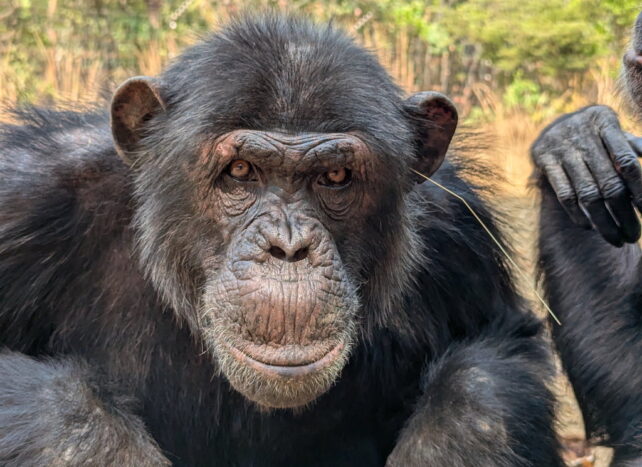If chimpanzees had access to TikTok, the platform might soon be flooded with videos of 'chimpfluencers' wearing grass in their ears and butts – the latest trend going around a chimp sanctuary in Africa.
In August 2023, at the Chimfunshi Wildlife Orphanage Trust sanctuary in Zambia, a trendsetting chimp named Juma was seen sticking a piece of grass into his ear, deep enough to stay there on its own. Within a week the fad went viral, as four other chimps in the group started copying his unusual accessory.
Not to be outdone, later that month Juma debuted a risqué variation: he inserted a blade of grass into his rectum, and left it dangling. This unorthodox trend also caught on, with five other chimps adopting the strange new fashion.
Related: Bored Capuchin Monkeys Are Kidnapping Howler Babies in Weird New 'Trend'
The behavior fascinated researchers observing the captive chimpanzees (Pan troglodytes) . The grass didn't seem to serve a biological purpose – they weren't scratching itchy ears or butts, for example. Instead, the team hypothesizes that it might serve a social purpose.
"By copying someone else's behavior, you show that you notice and maybe even like that individual. So, it might help strengthen social bonds and create a sense of belonging within the group, just like it does in humans," says Edwin van Leeuwen, biologist at Utrecht University in the Netherlands.

Intriguingly, the event wasn't the first time Chimfunshi chimps had decorated their orifices with grass. An original trendsetter named Julie started the whole grass-in-ear thing way back in 2010, which caught on with seven other chimps. The behavior continues to this day among the group, even after Julie's death.
This seems to be a case of social learning and cultural transmission – after all, only one of the four groups observed back then exhibited the behavior, even though all lived in similar conditions. Weirdest of all is that more than a decade after Julie, Juma seems to have come up with the idea independently, since his group never had contact with hers.
The researchers suggest that fads with no clear purpose could be a holdover from the important ability to learn new survival skills. It's telling that wild chimps haven't been observed following 'useless' trends – only captive ones seem to have enough time on their hands.
"Chimpanzees can socially learn novel skills and primarily use them in contexts of personal interest, like nut-cracking and termite fishing," the researchers write in a paper about their observations.
"Yet, when selection pressures relax (e.g., due to systematic provisioning in captive care), chimpanzees may extend their social learning occasionally to behaviors without direct instrumental utility."
Non-functional cultural trends aren't unique to chimps either. In recent years, orcas have been seen wearing dead salmon on their heads like hats, and sinking boats in European waters – both of which seem to be fads.
A group of wild Indo-Pacific bottlenose dolphins (Tursiops aduncus) in South Australia started 'tail-walking' along the surface of the water after one of them observed captive dolphins that had been trained to do the trick. Wild dolphins continued to perform the feat for decades afterwards, indicating the trend had been passed down culturally.
Studying animal cultures could help teach us more about our own. After all, is sticking grass in your butt really that different from planking or eating laundry detergent pods?
The research was published in the journal Behaviour.